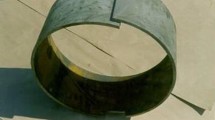Abstract
This paper presents effects of the annealing condition variables such as temperature and time on the residual stress mitigation. The effects were investigated by using the various measurement methods such as hole-drilling method and slitting method. As a result of the investigation, the residual stress mitigation magnitude increases with increasing the annealing time and temperature. Based on the investigation results, the quantitative correlations between the annealing variables and the residual stress mitigation were derived. Finally, the effect of long-term operation under the normal operating temperature conditions on the residual stress mitigation was investigated by referring to the derived equations and performing some additional tests, and it is identified that the residual stresses are not significantly relaxed over the design lifetime of the safety class III buried HDPE pipes.
Similar content being viewed by others
References
Handbook of Polyethylene Pipe, 2nd Ed., Plastics Pipe Institute, Irving, TX, USA (2008).
A. N. Haddad, ASME Code development roadmap for HDPE pipe in nuclear service, ASME STP-NU-057, ASME Standards Technology, LLC, New York, USA (2013).
ASME boiler and pressure vessel code case N-755-1, Use of Polyethylene (PE) Class 3 Plastic Pipe Section III, Division I and Section XI, The American Society of Mechanical Engineers, New York, USA (2011).
US NRC, High-density polyethylene (HDPE) buried piping for class 3 safety-related applications, Proceedings of the RIC 2011, Washington, D.C., USA (2011).
K. Chaoui, A. Chudnovsky and A. Moet, Effect of residual stress on crack propagation in MDPE pipes, Journal of Materials Science, 22 (1987) 3873–3879.
N. Brown, Slow crack growth-notches-pressurized polyethylene pipes, Polymer Engineering and Science, 47 (11) (2007) 1951–1955.
A. Bhatnagar and L. J. Broutman, Effect of annealing and heat fusion on residual stresses in polyethylene pipe, Proceedings of the 43 rd Annual Technical Conference, Washington D.C., USA (1985) 545–549.
R. K. Krishnaswamy and M. J. Lamborn, Influence of process history on the ductile failure of polyethylene pipes subject to continuous hydrostatic pressure, Advances in Polymer Technology, 24 (3) (2005) 226–232.
S. W. Choi and L. J. Broutman, Residual stresses in plastic pipes and fittings: I. methods for experimental analysis, Polymer, 21 (1) (1997) 71–82.
KEPCO E&C, Development of design and management technologies for application of polyethylene piping to nuclear power plants, Final Report, KETEP (2013).
Author information
Authors and Affiliations
Corresponding author
Additional information
Recommended by Associate Editor Nam-Su Huh
Jong-Sung Kim has been an associated professor of Dept. of Mechanical Engineering in Sunchon National University since 2008. He graduated at Yonsei Univ. with Ph.D. 1997 and then worked at Korea Power Engineering Company until 2007. He is interested in structural integrity assessment of power plant components.
Rights and permissions
About this article
Cite this article
Kim, JS., Yoo, JH. & Oh, YJ. A study on residual stress mitigation of the HDPE pipe for various annealing conditions. J Mech Sci Technol 29, 1065–1073 (2015). https://doi.org/10.1007/s12206-015-0218-7
Received:
Revised:
Accepted:
Published:
Issue Date:
DOI: https://doi.org/10.1007/s12206-015-0218-7




